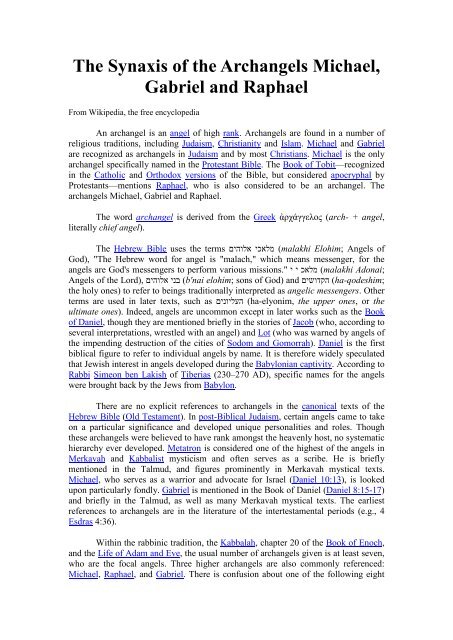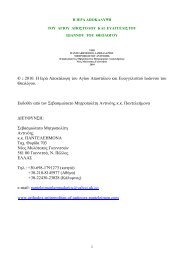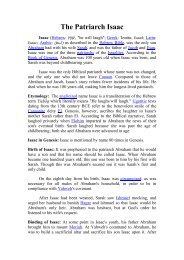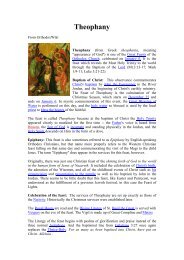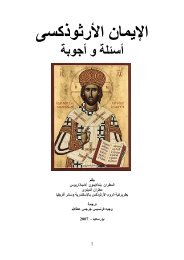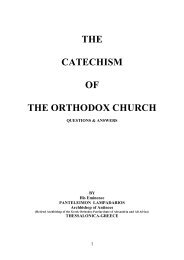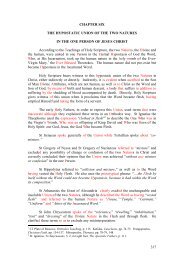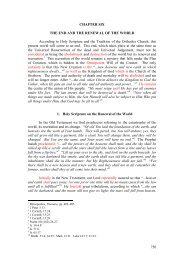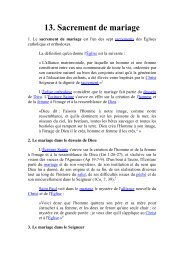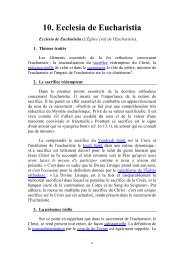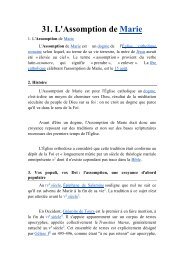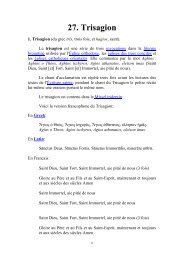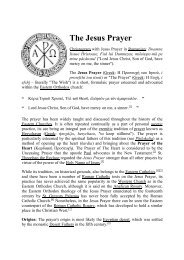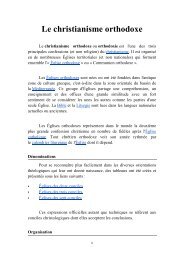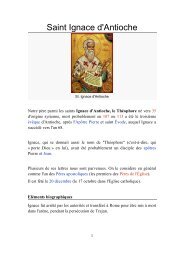The Synaxis of the Archangels Michael - Orthodox-mitropolitan-of ...
The Synaxis of the Archangels Michael - Orthodox-mitropolitan-of ...
The Synaxis of the Archangels Michael - Orthodox-mitropolitan-of ...
You also want an ePaper? Increase the reach of your titles
YUMPU automatically turns print PDFs into web optimized ePapers that Google loves.
<strong>The</strong> <strong>Synaxis</strong> <strong>of</strong> <strong>the</strong> <strong>Archangels</strong> <strong>Michael</strong>,<br />
Gabriel and Raphael<br />
From Wikipedia, <strong>the</strong> free encyclopedia<br />
An archangel is an angel <strong>of</strong> high rank. <strong>Archangels</strong> are found in a number <strong>of</strong><br />
religious traditions, including Judaism, Christianity and Islam. <strong>Michael</strong> and Gabriel<br />
are recognized as archangels in Judaism and by most Christians. <strong>Michael</strong> is <strong>the</strong> only<br />
archangel specifically named in <strong>the</strong> Protestant Bible. <strong>The</strong> Book <strong>of</strong> Tobit—recognized<br />
in <strong>the</strong> Catholic and <strong>Orthodox</strong> versions <strong>of</strong> <strong>the</strong> Bible, but considered apocryphal by<br />
Protestants—mentions Raphael, who is also considered to be an archangel. <strong>The</strong><br />
archangels <strong>Michael</strong>, Gabriel and Raphael.<br />
<strong>The</strong> word archangel is derived from <strong>the</strong> Greek ἀρχάγγελος (arch- + angel,<br />
literally chief angel).<br />
<strong>The</strong> Hebrew Bible uses <strong>the</strong> terms מלאכי אלוהים (malakhi Elohim; Angels <strong>of</strong><br />
God), "<strong>The</strong> Hebrew word for angel is "malach," which means messenger, for <strong>the</strong><br />
angels are God's messengers to perform various missions." מלאכ י י (malakhi Adonai;<br />
Angels <strong>of</strong> <strong>the</strong> Lord), בני אלוהים (b'nai elohim; sons <strong>of</strong> God) and הקדושים (ha-qodeshim;<br />
<strong>the</strong> holy ones) to refer to beings traditionally interpreted as angelic messengers. O<strong>the</strong>r<br />
terms are used in later texts, such as העליונים (ha-elyonim, <strong>the</strong> upper ones, or <strong>the</strong><br />
ultimate ones). Indeed, angels are uncommon except in later works such as <strong>the</strong> Book<br />
<strong>of</strong> Daniel, though <strong>the</strong>y are mentioned briefly in <strong>the</strong> stories <strong>of</strong> Jacob (who, according to<br />
several interpretations, wrestled with an angel) and Lot (who was warned by angels <strong>of</strong><br />
<strong>the</strong> impending destruction <strong>of</strong> <strong>the</strong> cities <strong>of</strong> Sodom and Gomorrah). Daniel is <strong>the</strong> first<br />
biblical figure to refer to individual angels by name. It is <strong>the</strong>refore widely speculated<br />
that Jewish interest in angels developed during <strong>the</strong> Babylonian captivity. According to<br />
Rabbi Simeon ben Lakish <strong>of</strong> Tiberias (230–270 AD), specific names for <strong>the</strong> angels<br />
were brought back by <strong>the</strong> Jews from Babylon.<br />
<strong>The</strong>re are no explicit references to archangels in <strong>the</strong> canonical texts <strong>of</strong> <strong>the</strong><br />
Hebrew Bible (Old Testament). In post-Biblical Judaism, certain angels came to take<br />
on a particular significance and developed unique personalities and roles. Though<br />
<strong>the</strong>se archangels were believed to have rank amongst <strong>the</strong> heavenly host, no systematic<br />
hierarchy ever developed. Metatron is considered one <strong>of</strong> <strong>the</strong> highest <strong>of</strong> <strong>the</strong> angels in<br />
Merkavah and Kabbalist mysticism and <strong>of</strong>ten serves as a scribe. He is briefly<br />
mentioned in <strong>the</strong> Talmud, and figures prominently in Merkavah mystical texts.<br />
<strong>Michael</strong>, who serves as a warrior and advocate for Israel (Daniel 10:13), is looked<br />
upon particularly fondly. Gabriel is mentioned in <strong>the</strong> Book <strong>of</strong> Daniel (Daniel 8:15-17)<br />
and briefly in <strong>the</strong> Talmud, as well as many Merkavah mystical texts. <strong>The</strong> earliest<br />
references to archangels are in <strong>the</strong> literature <strong>of</strong> <strong>the</strong> intertestamental periods (e.g., 4<br />
Esdras 4:36).<br />
Within <strong>the</strong> rabbinic tradition, <strong>the</strong> Kabbalah, chapter 20 <strong>of</strong> <strong>the</strong> Book <strong>of</strong> Enoch,<br />
and <strong>the</strong> Life <strong>of</strong> Adam and Eve, <strong>the</strong> usual number <strong>of</strong> archangels given is at least seven,<br />
who are <strong>the</strong> focal angels. Three higher archangels are also commonly referenced:<br />
<strong>Michael</strong>, Raphael, and Gabriel. <strong>The</strong>re is confusion about one <strong>of</strong> <strong>the</strong> following eight
names, concerning which one listed is not truly an archangel. [clarification needed] <strong>The</strong>y are:<br />
Uriel, Sariel, Raguel, and Remiel (possibly <strong>the</strong> Ramiel <strong>of</strong> <strong>the</strong> Apocalypse <strong>of</strong> Baruch,<br />
said to preside over true visions), Zadkiel, Jophiel, Haniel and Chamuel. Medieval<br />
Jewish philosopher Maimonides made a Jewish angelic hierarchy.<br />
<strong>The</strong> New Testament speaks frequently <strong>of</strong> angels (for example, angels giving<br />
messages to Mary, Joseph, and <strong>the</strong> shepherds; angels ministering to Christ after his<br />
temptation in <strong>the</strong> wilderness, an angel visiting Christ in his agony, angels at <strong>the</strong> tomb<br />
<strong>of</strong> <strong>the</strong> risen Christ, <strong>the</strong> angels who liberate <strong>the</strong> Apostles Peter and Paul from prison);<br />
however, it uses <strong>the</strong> word "archangel" only twice: "When <strong>the</strong> archangel <strong>Michael</strong>,<br />
contending with <strong>the</strong> devil, was disputing about <strong>the</strong> body <strong>of</strong> Moses, he did not presume<br />
to pronounce a blasphemous judgment, but said, '<strong>The</strong> Lord rebuke you'" (Jude 1:9;<br />
and "<strong>The</strong> Lord himself will descend from heaven with a cry <strong>of</strong> command, with <strong>the</strong><br />
voice <strong>of</strong> an archangel, and with <strong>the</strong> sound <strong>of</strong> <strong>the</strong> trumpet <strong>of</strong> God" (1 <strong>The</strong>ssalonians<br />
4:16.<br />
• St. Gabriel<br />
• St. <strong>Michael</strong><br />
• St. Raphael<br />
<strong>The</strong> last-named <strong>of</strong> <strong>the</strong>se identifies himself in Tobit 12:15 thus: "I am Raphael, one<br />
<strong>of</strong> <strong>the</strong> seven angels who stand and serve before <strong>the</strong> Glory <strong>of</strong> <strong>the</strong> Lord.". Of <strong>the</strong>se<br />
seven "archangels", which appear in <strong>the</strong> angelology <strong>of</strong> post-Exilic Judaism, only <strong>the</strong><br />
above three, Gabriel, <strong>Michael</strong> and Raphael, are mentioned in <strong>the</strong> Scriptures that <strong>the</strong><br />
Catholic Church considers canonical. <strong>The</strong> o<strong>the</strong>rs, according to <strong>the</strong> Book <strong>of</strong> Enoch, are<br />
Uriel, Raguel, Sariel, and Jerahmeel, while from o<strong>the</strong>r apocryphal sources we get <strong>the</strong><br />
variant names Izidkiel, Hanael, and Kepharel instead <strong>of</strong> <strong>the</strong> last three in <strong>the</strong> o<strong>the</strong>r list.<br />
<strong>The</strong> Fourth Book <strong>of</strong> Esdras, which mentions <strong>the</strong> angel Uriel, was popular in <strong>the</strong> West<br />
and was frequently quoted by Church Fa<strong>the</strong>rs, especially Ambrose, but was never<br />
considered part <strong>of</strong> <strong>the</strong> biblical canon. [12]<br />
Eastern <strong>Orthodox</strong><br />
Eastern <strong>Orthodox</strong> Tradition mentions "thousands <strong>of</strong> archangels; however, only<br />
seven archangels are venerated by name. Uriel is included, and <strong>the</strong> o<strong>the</strong>r three are<br />
most <strong>of</strong>ten named Selaphiel, Jegudiel, and Barachiel (an eighth, Jeremiel, is<br />
sometimes included as archangel). <strong>The</strong> <strong>Orthodox</strong> Church celebrates <strong>the</strong> <strong>Synaxis</strong> <strong>of</strong><br />
<strong>the</strong> Archangel <strong>Michael</strong> and <strong>the</strong> O<strong>the</strong>r Bodiless Powers on November 8. O<strong>the</strong>r feast<br />
days <strong>of</strong> <strong>the</strong> <strong>Archangels</strong> include <strong>the</strong> <strong>Synaxis</strong> <strong>of</strong> <strong>the</strong> Archangel Gabriel on March 26<br />
(April 8), and <strong>the</strong> Miracle <strong>of</strong> <strong>the</strong> Archangel <strong>Michael</strong> at Colossae on September 6<br />
(September 19). In addition, every Monday throughout <strong>the</strong> year is dedicated to <strong>the</strong><br />
Angels, with special mention being made in <strong>the</strong> church hymns <strong>of</strong> <strong>Michael</strong> and<br />
Gabriel. In <strong>Orthodox</strong> iconography, each angel has a symbolic representation:<br />
<strong>Michael</strong> in <strong>the</strong> Hebrew language means "Who is like unto God?" or "Who is equal to<br />
God?" St. <strong>Michael</strong> has been depicted from earliest Christian times as a commander,<br />
who holds in his right hand a spear with which he attacks Lucifer/Satan, and in his left<br />
hand a green palm branch. At <strong>the</strong> top <strong>of</strong> <strong>the</strong> spear <strong>the</strong>re is a linen ribbon with a red<br />
cross. <strong>The</strong> Archangel <strong>Michael</strong> is especially considered to be <strong>the</strong> Guardian <strong>of</strong> <strong>the</strong><br />
<strong>Orthodox</strong> Faith and a fighter against heresies.
• Gabriel means "Man <strong>of</strong> God" or "Might <strong>of</strong> God." He is <strong>the</strong> herald <strong>of</strong> <strong>the</strong><br />
mysteries <strong>of</strong> God, especially <strong>the</strong> Incarnation <strong>of</strong> God and all o<strong>the</strong>r mysteries<br />
related to it. He is depicted as follows: In his right hand, he holds a lantern with a<br />
lighted taper inside, and in his left hand, a mirror <strong>of</strong> green jasper. <strong>The</strong> mirror<br />
signifies <strong>the</strong> wisdom <strong>of</strong> God as a hidden mystery.<br />
• Raphael means "God's healing" or "God <strong>the</strong> Healer" (Tobit 3:17, 12:15).<br />
Raphael is depicted leading Tobit (who is carrying a fish caught in <strong>the</strong> Tigris)<br />
with his right hand, and holding a physician's alabaster jar in his left hand.<br />
• Uriel means "Fire <strong>of</strong> God," or "Light <strong>of</strong> God" (III Esdras 3:1, 5:20). He is<br />
depicted holding a sword against <strong>the</strong> Persians in his right hand, and a flame in his<br />
left.<br />
• Sealtiel means "Intercessor <strong>of</strong> God" (III Esdras 5:16). He is depicted with his<br />
face and eyes lowered, holding his hands on his bosom in prayer.<br />
• Jegudiel means "Glorifier <strong>of</strong> God." He is depicted bearing a golden wreath in<br />
his right hand and a triple-thonged whip in his left hand.<br />
• Barachiel means "Blessing <strong>of</strong> God." He is depicted holding a white rose in his<br />
hand against his breast.<br />
• (Jeremiel means "God's exaltation." He is venerated as an inspirer and<br />
awakener <strong>of</strong> exalted thoughts that raise a person toward God (III Ezra 4:36). As<br />
an eighth, he is sometimes included as archangel.)


